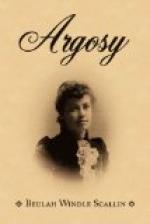The low terraced hills looked bleak and dreary, a watery sky above them. The pale sunset gleams were reflected in the pools of water on the roadside, not yet absorbed into the light limestone soil. The straggling one-sided street forming the entrance to Cloon looked more squalid than usual, the houses more wretched under their grass-grown thatch, the gleam and ring from the smithy the only touch of light and sound that relieved their gloom.
Louise Eden walked up the little path to the Doctor’s house, and, knocking at the door, asked the old woman who appeared for news of her master.
“Indeed, he’s the one way always,” was the reply; “no better and no worse since they brought him and laid him on the bed. You’d pity him to see him lying there, me fine boy.”
“Will you give him a message from me?” asked Louise. “Will you say I have come to ask how he is, and to say good-bye, as I am going back to England?”
“He’ll be sorry for that, indeed,” said the old woman. “Sure, you’d best go up and see him yourself.”
“Oh, no,” said Louise, shrinking back, “unless—his life is not in danger, I hope?”
“Danger, is it,” echoed old Mamie, indignantly, though not without a momentary glance of uneasiness. “Why would he be in danger? Sure he wasn’t so much hurted as that. He bled hardly at all only for a little cut on the head, and sure he has all he wants, and a nurse coming from Dublin and one of the nuns sitting with him now. It’d be a bad job if he was in danger, only twenty-four year old, and having such a nice way of living, and, indeed, he has the prayers of the poor. Go up the stairs and see him—here’s his reverence coming, and might want me,” she continued, as a car stopped at the gate.
Reluctantly, yet not knowing how to draw back, and unwilling to meet the priest, whom she knew slightly, Louise went up the narrow staircase. She knocked at a door standing ajar, and hearing a low “come in,” entered. It was a small bare room enough, no carpet save one narrow strip, whitened walls, and a great fire smouldering under the chimney-board of black painted wood. Even at that first glance she noticed that the only attempt at ornament was a vase containing a bunch of the red-seeded wild iris; she remembered having gathered and given it to the Doctor a little time before as a “yerb” sometimes in request amongst his patients.
The fading light fell on the low iron bed upon which the young man lay, propped up with pillows. His face was much altered by these two or three days of suffering. The fair hair was covered by a bandage and the blue eyes looked larger for the black shades beneath them. But as he saw who his visitor was, a smile, very sweet and radiant, lighted them up, and a little colour came into the pallid cheeks. A nun, dressed in black and with a heavily-veiled bonnet half concealing her face, sat by his bedside, and looked with curiosity at the girl as she came in and gave her hand to the patient.




